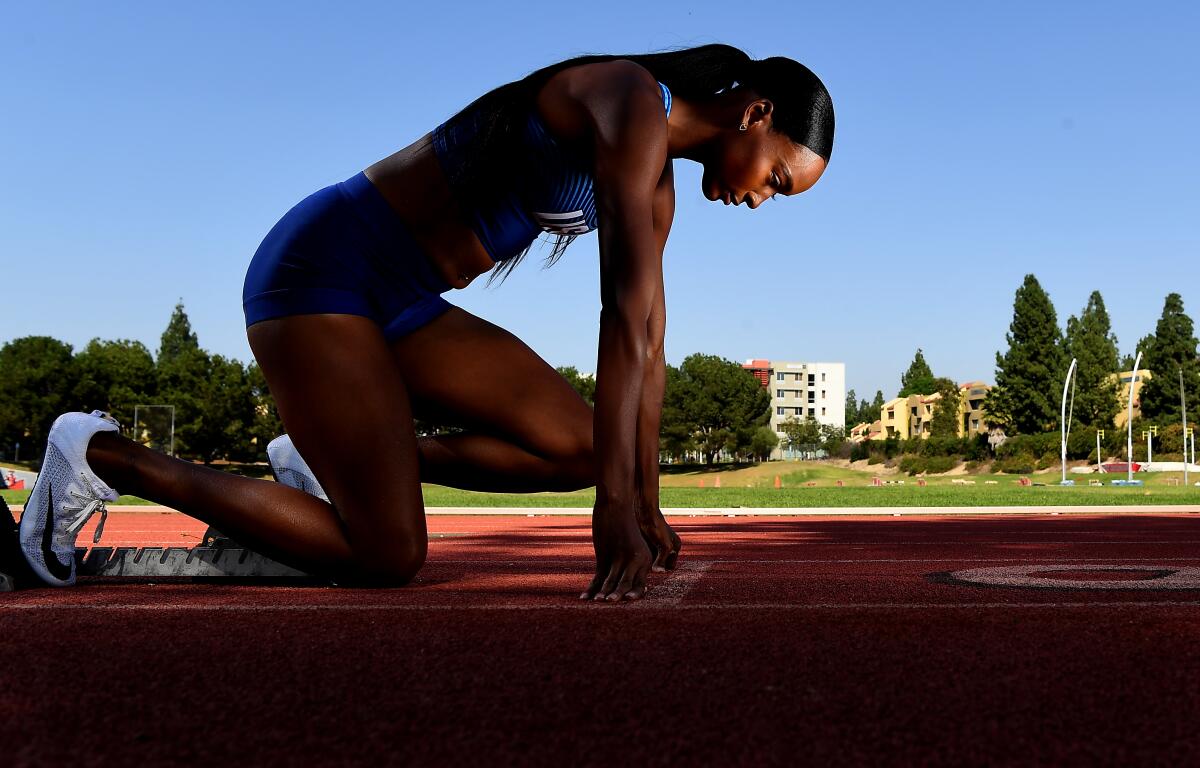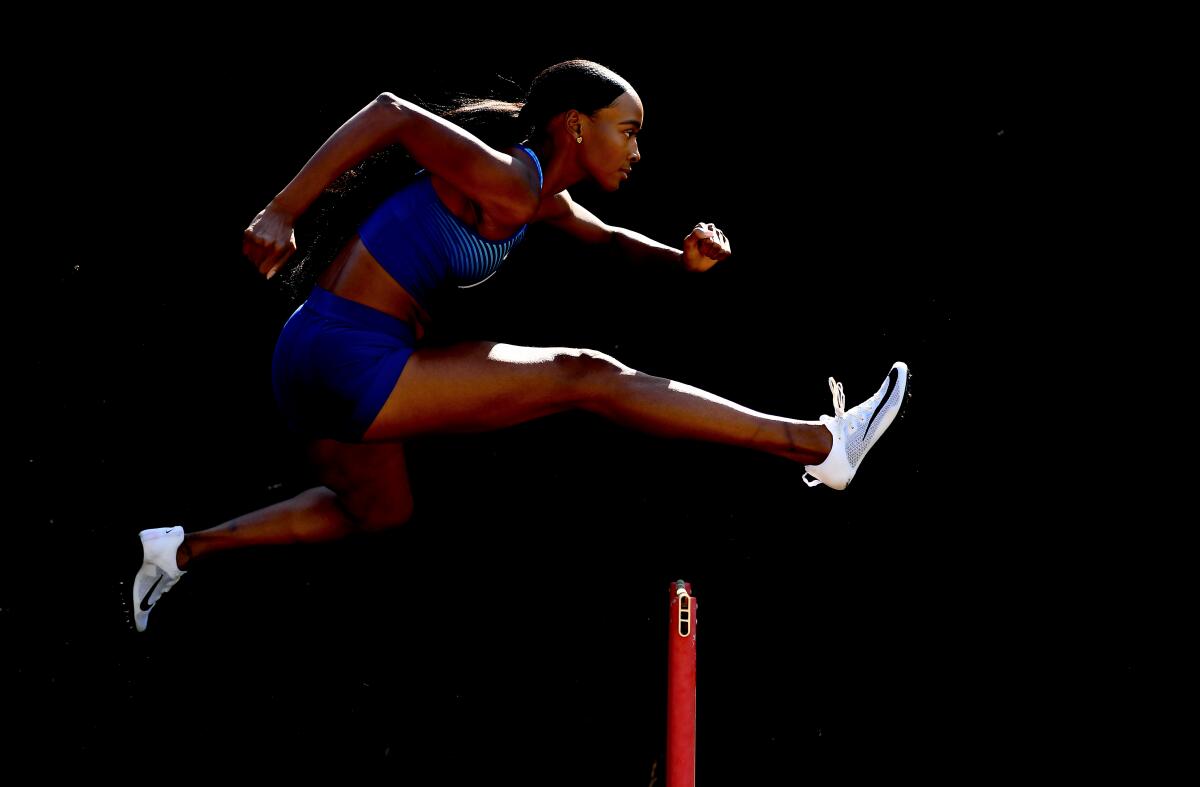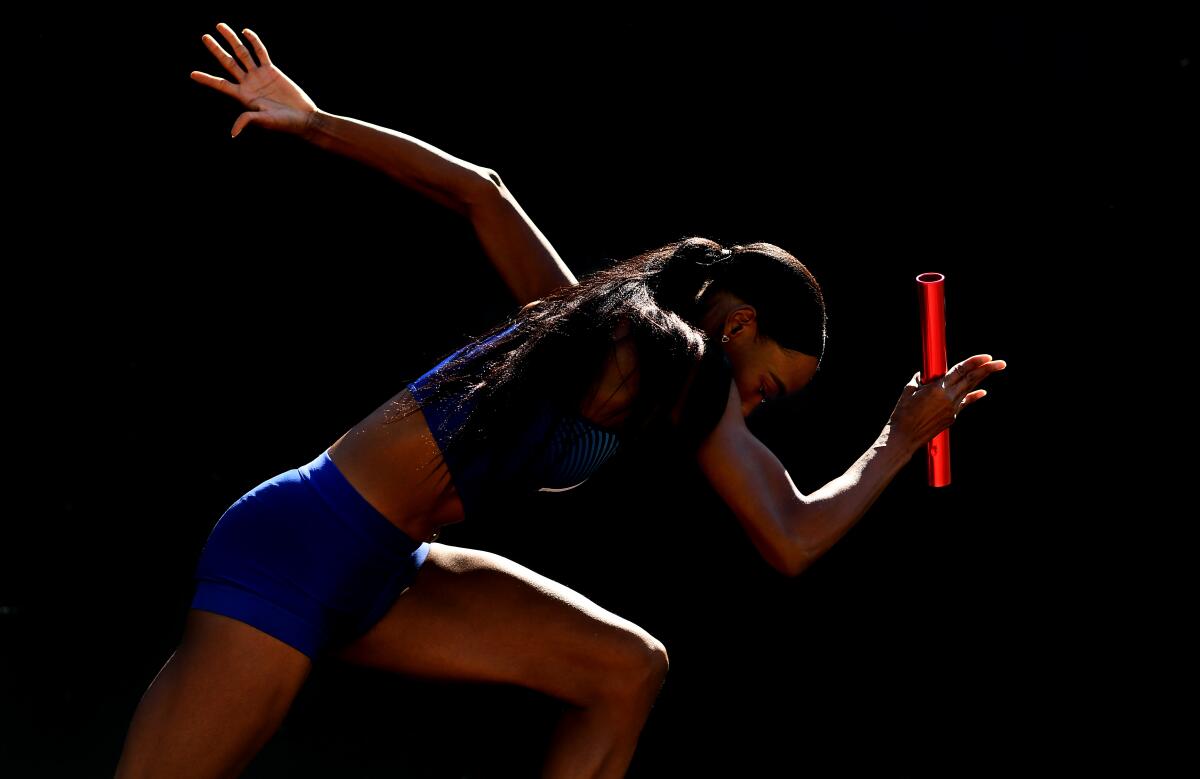Hurdles champion Dalilah Muhammad is ‘a tiger walking alone in the jungle’

- Share via
Now the truth can be told about Dalilah Muhammad’s dazzling performance at the recent world track championships.
After some jitters leading up to the big day, the USC alumnus woke to a sense of calm on the morning of the women’s 400-meter hurdles. Muhammad felt so relaxed that she sat down to a stack of pancakes for breakfast.
American teammate Noah Lyles spotted the plateful of starch and asked, “Isn’t your event tonight?”
A hefty meal did nothing to slow Muhammad, who bettered her own world record on the way to a gold medal that evening. Her time of 52.16 seconds put her .07 seconds ahead of Sydney McLaughlin, setting the table for a rematch between the American rivals at the 2020 Tokyo Olympics.
Not that Muhammad seems terribly excited by it all. Built slim and strong, she is deadpan by nature, letting slip with the occasional grin but otherwise keeping her words at a steady intonation. Her coach calls her “a tiger walking alone in the jungle.”
“I had a lot of goals for this year,” she says. “A lot of them came true.”

With the track season complete, Muhammad can rest awhile. She has a couple of vacation trips planned but spent a recent afternoon stretching and jogging at the Cal State Northridge track, her regular training site.
Success has come relatively late in life for a 29-year-old who began running for fun, sprinting around the buildings in her Queens, N.Y., neighborhood as a child.
“I’d race against everybody,” she says. “Even the boys.”
A local club coach spotted her and asked her parents to bring her to practice. Muhammad, an American Muslim whose father, Askia, is an imam and chaplain for the New York City Dept. of Correction, quickly took to the sport.
Pure enjoyment became something serious in high school, where she won not only state and national titles but also a gold medal at the 2007 IAAF World Youth Championships. A visit to Los Angeles convinced her to accept a scholarship offer from the Trojans.
Some athletes would have been satisfied with what Muhammad accomplished at USC, where she was an All-American and won bronze at the 2009 NCAA championships. But after graduating with a business degree in 2012, she left campus unhappy, saying: “I just wanted a lot more.”
There was a brief surge after college, including a silver medal at the 2013 world championships, but then came injury and a slump that lasted the better part of two seasons.

At that point, a simple thought crossed her mind. Someone was going to win the 400 hurdles at the upcoming 2016 Summer Olympics in Rio de Janeiro. Why not her?
This question, she says, “freed me up to make changes.”
The hurdles are highly specialized, with athletes obsessing over nuances such as stride length, shin angle and hip extension. Muhammad switched to Lawrence “Boogie” Johnson, a former Cal State Northridge coach, for help.
A demon for technique, Johnson started her from scratch.
“We broke everything down,” he recalls. “The change was either going to keep her in the sport or send her to an early retirement mode.”
The first weeks of training felt like an eternity to Muhammad, but Johnson saw reason to expect improvement.
“As a coach, you tell some athletes, “I’m going to do the thinking, you just do the doing,’” he says. “But Dalilah is probably one of the smartest athletes I’ve ever coached. She doesn’t just go home and lie on the couch and watch ‘Days of our Lives.’ She thinks about the practice session and what it takes to get better.”
Her ability to understand coachspeak, no translation required, was only part of it. She also possesses an internal clock that constantly measures the pace through 400 grueling meters.
“Good with time,” Johnson says. “Good with rhythm.”
Worried about oppressive heat at the 2020 Summer Games in Tokyo, Olympic leaders will relocate the marathon and race walking 500 miles north to Sapporo.
By the spring of 2016, something clicked. Muhammad ran a world-leading time to win the Olympic trials and earn a spot on the team. Her confidence grew.
“I was faster than I had ever been,” she says. “I knew I was a different athlete.”
Thus began a rapid ascendance to the top of her event. After taking gold at the Summer Games — again, there was an eerie, pre-race calm — she set a world record at the 2019 U.S. outdoor championships in July.
The previous mark stood for 16 years. She would need only a few more months to run even faster.
Her race ranked among the most-anticipated events at the recent world championships in Doha, Qatar. All eyes focused on the burgeoning rivalry between Muhammad and McLaughlin, a prodigious 20-year-old who had outrun her in a couple of big races during the season.
“There’s pressure,” Muhammad says. “Maybe it puts a little doubt in your mind.”
A tendency to over-strategize might be her biggest weakness. It can translate into a conservative approach mid-race, letting off the gas to save energy for the end.
Her coach had seen her run more freely — and faster — in practice. Before the final in Doha, he told her: “Let your legs go. Just let it flow.”
A fast start put Muhammad in front early, but McLaughlin stayed close. Both runners kept the pace through the middle section and rounded the final turn well ahead of the pack.
The race might have been decided at the eighth hurdle, with Muhammad maintaining a 15-stride pace and McLaughlin faltering the slightest bit. That was all the older runner needed to power down the homestretch, leaning for a victory at the tape.
Her face spread into a smile as the world-record time flashed across the scoreboard. McLaughlin, who ran the third-fastest time ever, showed a different sort of expression, as in what do I have to do to win?
“I knew it would be fast,” she told reporters. “But I didn’t think it would be that fast.”
The next all-important outdoor season — a run-up to the Summer Games — does not begin until spring. In the meantime, Muhammad will rest a few weeks before sitting down with her coach to compile a to-do list.
Small goals for training. A step-by-step process.
After so many years of struggling, her career an uphill battle, she is now fighting to stay on top. Defending her Olympic title in Tokyo next summer probably will involve another showdown with McLaughlin.
As Muhammad put it: “I’m definitely getting chased.”
More to Read
Go beyond the scoreboard
Get the latest on L.A.'s teams in the daily Sports Report newsletter.
You may occasionally receive promotional content from the Los Angeles Times.












